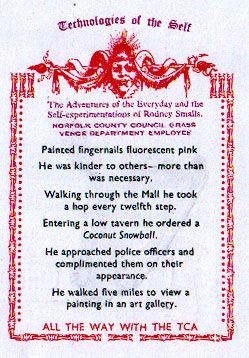A busy week, reciprocity wise.
Been reading Grant H Kester’s “Conversation Pieces: The Role of Dialogue in Socially Engaged Art” (downloadable pdf: www.grantkester.net/…/Conversation+Pieces_+The+Role+of+Dialogue+in+Socially-Engaged+Art.pdf) in which he talks of the artist’s role in participatory art of ‘creative orchestration’ – which seems like a good description of what I’m aiming to do with this project. I really like how he writes and plan to seek out more of his writing.
I’ve also been investigating the work of US artist and writer Suzanne Lacy (http://www.suzannelacy.com/) who works with performance, collaboration and activism. She developed the idea of ‘new genre’ public art in her essay collection ‘Mapping the terrain: new genre public art’, about the impact of performance art in public spaces. An early seminal project includes “Three Weeks in May”(1977), which was an event which combined a performance piece on the steps of Los Angeles City Hall with self-defence classes for women in an attempt to highlight sexual violence against women.Lacy revisited the theme of rape for a commissioned work for last year’s Liverpool Biennial:
“As part of Liverpool Biennial, Lacy extends her project to raise awareness and debate around the problem of rape and domestic violence. At the Cunard, she will present a screening of Storying Rape, a performative conversation that took place between seven civic and cultural leaders at the top of Los Angeles City Hall. Shaped by literary theory, this conversation focused on how the narrative of rape is presented in various public spheres – and how re-framing this narrative might improve public understanding and lessen this form of against women. A second room presents a social media campaign that will be launched during the Biennial, accompanied by a series of conversations about rape and domestic violence that will take place around the city including at Metal. Young people, politicians and community leaders will discuss a subject that for many remains taboo.”
http://liverpoolbiennial.co.uk/programmes/festivals/artists/42/4/2012/355/suzanne-lacy/
Wish I had been able to experience this, but my Liverpool trip was taken up with the ‘Inhospitable’ exhibition I was involved in as part of the Liverpool Independents. Ach well, you can’t do everything can you.
I also met up with Bradford-based anthropologist and oral historian Irna Qureshi to talk to her about reciprocity in her practice. I have been interested in Irna’s work for some time and finding out about her work particularly with the Muslim community in Pakistan and in the UK was fascinating. A illuminating (and very entertaining) 2 hours flew by as she told me about projects past and present. It was a joy, just to talk and discover. There’s not enough space here, so I plan to transcribe the interview and publish it in Issue 2 of my ‘Reciprocity’ zine, hopefully published in early March.
I’ve started work on the collaborative e-zine I’m doing with artist and a-n blogger Sophie Cullinan documenting our daily exchanges of words and images during my Generosity Advent Calendar in December last year. It’s going to be fun (and maybe a bit logistically challenging) to collaborate on a zine via email, but its as much about learning about the process as the finished publication and I’m really looking forward to working with Sophie on it.
And finally, thinking about a project for PANDEMIC Leeds, a weekend event ‘linking art, performance and talks to the state of capitalism, economies and society’ happening 26th/27th April, http://pandemicleeds.wix.com/pandemic. Seems an apt opportunity for this project, need to sort out a proposal before the deadline 31st Jan.
With all this going on I haven’t even got near my new book purchase ‘Sacred Economics: Money, Gift and Society in The Age of Transition’ by Charles Eisenstein (as recommended by Alinah Azadeh in her cracking a-n blog ‘Burning The Books’ www.a-n.co.uk/p/2831785/.
Well, maybe the weekend.
Happy Friday, everyone.




